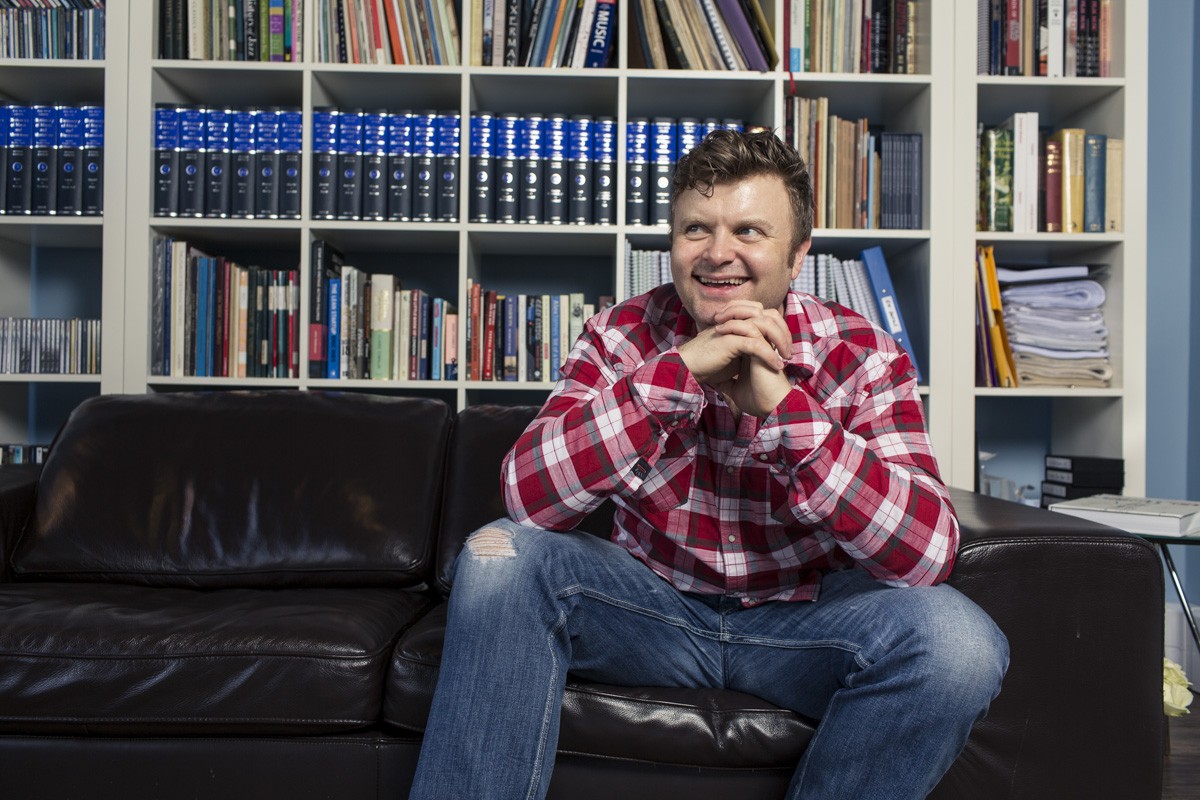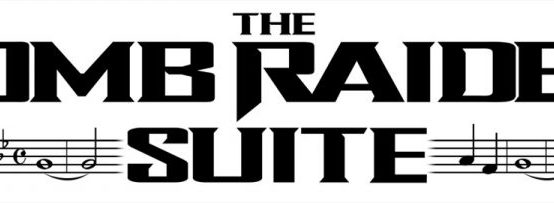
Ahead of his appearance at Game Music Connect 2015 we catch up with composer and Spitfire Audio co-founder, Paul Thomson!
Paul started his musical training at an early age, playing the piano, clarinet and cathedral organ as a child and touring the world as a chorister, in Worcester Cathedral Choir. Upon achieving his MA degree he quickly established himself as a versatile producer/composer in London, working with most of the major and large independent record labels on diverse acts.
Paul has recently delivered the scores to the multiple award winning independent movie ‘Missed Connections’, and the acclaimed ‘Half Of A Yellow Sun’ starring Thandie Newton and Chiwetel Ejiofor. He also scored the BAFTA winning BBC Drama production ‘The Fades’ (a coproduction with BBC America), for which he won the RTS Award for original title music. He also recently scored the BBC1 primetime drama ‘The Interceptor’.
His music is in huge demand for many of the top rating shows including ‘The X Factor’, ‘Britain’s Got Talent’, ‘Kardashians’, ‘Alan Carr’s Celebrity Ding Dong’, ‘The Apprentice/Celebrity Apprentice’ (advertising task composer), ‘Snoop Dogg’s Father Hood’, ‘America’s Got Talent’ and many more.
He composed and produced a number of albums worth of material for Hans Zimmer’s ‘Directors Cuts’ collaboration with Extreme Music and Sony ATV and has also written albums for Boosey and Hawkes/Imagem Production Music.
In the games field Paul has worked extensively with Media Molecule and Sony CE in Europe and the USA as lead composer on the highly anticipated PS4 game ‘Little Big Planet 3’, also lead on ‘Little Big Planet 2’, ‘Little Big Planet Vita’, ‘Little Big Planet Karting’, and as sole composer on several DLCs for the platform including ‘Pirates of the Caribbean’ and ‘Marvel’.
He is co-owner of the world leading ‘Spitfire Audio’ sample library company used by the world’s most successful film composers. The first use of these sounds was in Harry Gregson-Williams’ score for the Narnia ‘Prince Caspian’ movie, but they have been used in James Cameron’s ‘Avatar’ franchise, ‘Iron Man 2’, ‘Ice Age 3’, and many many more major film projects.
A keen music technologist, Paul enjoys creating varied new instruments and sounds for his scores, an approach which helps set him apart from many of his contemporaries.
Thanks for talking to us Paul, it’s great to have you! Before we discuss your work and Game Music Connect 2015, talk us through how your journey into music composition began?
Thanks for your welcome! I was immersed in music from a very young age, I sang as a chorister in Worcester Cathedral Choir, everything from Howells and Elgar to Bruckner, Finzi, Byrd, Britten… I had the incredible experience of singing the high C’s in Allegri’s Miserere several years running. I was encouraged to compose from a young age by the choirmaster Dr Donald Hunt. I experimented with all kinds of styles, and ended up doing a composition and performance minor within my Aeronautical Engineering degree thanks to the liberal attitude of my tutors at Bristol University! I studied Film and TV music at Bournemouth for my MA and then moved to London and started writing professionally. I wrote a lot of TV themes and music for commercials, eventually moving into drama.
What would you say was your biggest turning point during that time?
In 2005 I started really seriously making my own samples to use in my work, beyond the usual “a few nice hits and risers” and weird sounds: I started trying to sample and create some quite complex instruments. I found this totally revelatory and very slowly started managing to get the sound in my head out into the recordings, working with a combination of these new instruments and live players.
Out of your whole career is there a moment that stands out as most challenging?
I worked on a show that required nearly 50 minutes of hybrid orchestral music in the final episode: doing that single-handedly (no assistants!) and keeping it all good and interesting was a real training for my composition ‘muscle’ – I guess the equivalent to getting a sixpack!
On the flip-side is there anything in particular you’re most proud of?
I’m incredibly proud of the work I did on the BBC series ‘The Fades’ for which I won the RTS award – the show itself won the BAFTA for Best Drama. I’m also really proud of Little Big Planet – that’s the thing that my kids and their friends talk about the most!
Your most recent video game title was Little Big Planet 3, but you’ve worked on the series for a while. What has it been like writing music for the Little Big Planet series compared to other projects?
Little Big Planet has been a wonderful series to work on. I’m mostly given a pretty free artistic rein, within limits!!, and while keeping one eyebrow poised in a serious fashion I can be as outrageous as I like and write all kinds of crazy stuff, from knock off “English Tradition” to exercise all my modal likes, right the way through super romantic, to mediaeval, hybrid action music, acid jazz, it’s never ending. The guys I’ve worked with at Sony, Media Molecule and the other development teams have been such a lovely bunch of people to work with, just great teams and a very supportive atmosphere.
How has the process evolved as the game has progressed across various consoles?
There have been a few technical differences, but the core of the process has remained the same, whether its straight score or adaptive music, and my role has been to supply the meat of the ‘storytelling’ for the games.
It must be amazing to work with such varying IP’s under one umbrella?
Very exciting to have worked on Pirates, Marvel, and so on – trying to re-interpret these original and amazing IPs while bringing something new to the table, slightly terrifying knowing that Jerry Bruckheimer was signing off!
So tell us more about the library side of your work, what led you in that direction?
So as I mentioned, I really got the bug for sampling in a more complex fashion and happened to be meeting up with Christian Henson for lunch in a pub in Soho (we shared an agent) – we discovered that we both had this passion for ‘rolling our own’ – and decided to try and make a really good Chamber Strings library – recording it the same way we would record a film score, just one note at a time! That was the ‘bespoke’ project, that eventually encompassed Symphonic Strings, Brass and WW, and then we gradually and almost accidentally ended up as a commercial endeavour. We continued to apply our ethos, to everything we recorded, absolute highest possible recording chain, the best instruments and players, recording to tape, and so on. Folly of the highest order! We also wanted the whole effort to reward the players and techs, so we started a royalty scheme on sales. We are incredibly proud of the fact that we have managed to bring sampling back into the centre of the music industry rather than it leeching on the side.
The sounds that you have co-produced have been used in some fantastic films firstly by Harry Gregson-Williams in Narnia: Prince Caspian, but also other greats such as Avatar and Iron Man 2. What would be your dream goal for the libraries?
We see our libraries as a set of inspirational tools. We’ve recorded 11 string based libraries so far and no sign of letting up! We love working with the incredible players in London, and we’ve seen that our efforts have helped to keep the players and studios busy, not just on our crazy ideas and new projects, but bringing new composers to London to work with the players as a result of them using our libraries for their demos. We all know everything sounds so much better when you have a group of great players playing your music – even if you can only afford a few, it’s night and day!
Is this your first time attending Game Music Connect as well as speaking?
Yes, this is my first GMC, I’m looking forward to reconnecting with some old friends and meeting new ones!
What are you looking forward to most at this year’s event?
Nervously looking forward to giving our presentation, that odd thrill and feeling of panic immediately before is an exciting diversion from my usual day to day job – it must be close to the rush that actors get before stepping on stage! I’m looking forward to hearing Chuck Doud speak, and also to hearing more about Alien: Isolation, having seen Christian’s pile of scores getting higher and higher and hearing about some of the really cool revolutionary ways that surround was employed on the project!
Can you tell us what to look forward to in your session, Creating Virtual Orchestras, without spoilers of course?
We are going to be handing out free Pimms! (not really)
Thanks again Paul, we look forward to seeing you there!
We hope you enjoyed the interview! Check out more of Paul at his Official as well as more on his Game Music Connect 2015 session, Creating Virtual Orchestras, Here.
We hope you enjoyed the interview, check out more over at our Interviews page and don’t miss a thing by signing up to our Monthly Newsletter!
Article by Sam Hughes
11th September 2015




